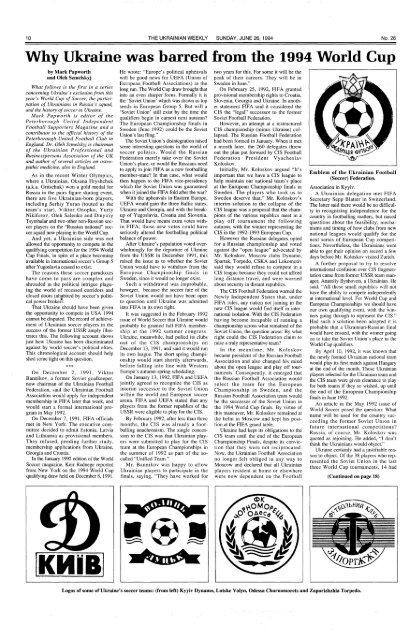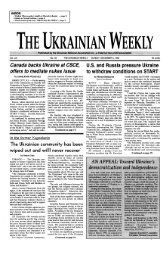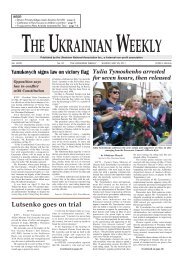The Ukrainian Weekly 1994
The Ukrainian Weekly 1994
The Ukrainian Weekly 1994
You also want an ePaper? Increase the reach of your titles
YUMPU automatically turns print PDFs into web optimized ePapers that Google loves.
10 THE UKRAINIAN WEEKLY SUNDAY, JUNE 26,<strong>1994</strong> No. 26<br />
Why Ukraine was barred from the <strong>1994</strong> World Cup<br />
by Mark Papworth<br />
and Oleh Szmelskyj<br />
What follows is the first in a series<br />
concerning Ukraine's exclusion from this<br />
year's World Cup of Soccer, the partici–<br />
pation of <strong>Ukrainian</strong>s in Russia's squad,<br />
and the history of soccer in Ukraine.<br />
Mark Papworth is editor of the<br />
Peterborough United independent<br />
Football Supporters Magazine and a<br />
contributor to the official history of the<br />
Peterborough United Football Club in<br />
England. Dr. Oleh Szmelskyj is chairman<br />
of the <strong>Ukrainian</strong> Professional and<br />
Businesspersons Association of the UK<br />
and author of several articles on osteo–<br />
pathic medicine, also in England.<br />
As in the recent Winter Olympics,<br />
where a <strong>Ukrainian</strong>, Oksana Hryshchuk<br />
(a.k.a. Gritschuk) won a gold medal for<br />
Russia in the pairs figure skating event,<br />
there are five <strong>Ukrainian</strong>-born players,<br />
including Serhiy Yuran (touted as the<br />
team's star), viktor Onopko, Yuriy<br />
Nikiforov, Oleh Salenko and Dmytriy<br />
Tsymbalar and two other non-Russian soc–<br />
cer players on the "Russian national" soc–<br />
cer squad now playing in the World Cup.<br />
And yet, a <strong>Ukrainian</strong> side was not<br />
allowed the opportunity to compete in the<br />
qualifying competition for the <strong>1994</strong> World<br />
Cup Finals, in spite of a place becoming<br />
available in international soccer's Group 5<br />
after Yugoslavia ceased to exist.<br />
<strong>The</strong> reasons these soccer paradoxes<br />
have come to pass are complex and<br />
shrouded in the political intrigue plagu–<br />
ing the world of recessed corridors and<br />
closed doors inhabited by soccer's politi–<br />
cal power broker^.<br />
That Ukraine should have been given<br />
the opportunity to compete in USA <strong>1994</strong><br />
cannot be disputed. <strong>The</strong> record of achieve–<br />
ment of <strong>Ukrainian</strong> soccer players in the<br />
success of the former USSR amply illus–<br />
trates this. <strong>The</strong> following account shows<br />
just how Ukraine has been discriminated<br />
against by world soccer's political elites.<br />
This chronological account should help<br />
shed some light on this question.<br />
: f c ^<br />
On December 2, 1991, viktor<br />
Bannikov, a former Soviet goalkeeper,<br />
now chairman of the <strong>Ukrainian</strong> Football<br />
Federation, said the <strong>Ukrainian</strong> Football<br />
Association would apply for independent<br />
membership in F1FA later that week, and<br />
would start a formal international program<br />
in May 1992.<br />
On December 7, 1991, F1FA officials<br />
met in New York. <strong>The</strong> executive com–<br />
mittee decided to admit Estonia, Latvia<br />
and Lithuania as provisional members.<br />
<strong>The</strong>y refused, pending further study,<br />
membership applications from Ukraine,<br />
Georgia and Croatia.<br />
in the January 1992 edition of the World<br />
Soccer magazine, Keir Radnege reported<br />
from New York on the <strong>1994</strong> World Cup<br />
qualifying draw held on December 8,1991.<br />
He wrote: "Europe's political upheavals<br />
will be good news for UEFA (Union of<br />
European Football Associations) in the<br />
long run. <strong>The</strong> World Cup draw brought that<br />
into an even sharper focus. Formally it is<br />
the 'Soviet Union' which was drawn as top<br />
seeds in European Group 5. But will a<br />
'Soviet Union' still exist by the time the<br />
qualifiers begin in earnest next autumn<br />
<strong>The</strong> European Championship finals in<br />
Sweden (June 1992) could be the Soviet<br />
Union's last fling."<br />
<strong>The</strong> Soviet Union's disintegration raised<br />
some interesting questions in the world of<br />
soccer politics. Would the Russian<br />
Federation merely take over the Soviet<br />
Union's place, or would the Russians need<br />
to apply to join FTFA as a new footballing<br />
member-state in that case, what would<br />
then happen to the F1FA vice-presidency<br />
which the Soviet Union was guaranteed<br />
when it joined the FTFA fold after the war<br />
With the upheavals in Eastern Europe,<br />
UEFA would gain the three Baltic states,<br />
Ukraine and Georgia, and with the breakup<br />
of Yugoslavia, Croatia and Slovenia.<br />
That would have meant extra votes with–<br />
in F1FA; those new votes could have<br />
seriously altered the footballing political<br />
balance of power.<br />
After Ukraine's population voted over–<br />
whelmingly for the departure of Ukraine<br />
from the USSR in December 1991, this<br />
raised the issue as to whether the Soviet<br />
Union would have to withdraw from the<br />
European Championship finals in<br />
Sweden, since it would no longer exist.<br />
Such a withdrawal was improbable,<br />
however, because the soccer fate of the<br />
Soviet Union would not have been open<br />
to question until Ukraine was admitted<br />
into F1FA in its own right.<br />
it was suggested in the February 1992<br />
issue of World Soccer that Ukraine would<br />
probably be granted full F1FA membership<br />
at the 1992 summer congress.<br />
Ukraine, meanwhile, had pulled its clubs<br />
out of the OS championships on<br />
December 13, 1991, and said it would run<br />
its own league. <strong>The</strong> short spring champi–<br />
onship would start shortly afterwards,<br />
before falling into line with Western<br />
Europe's autumn-spring scheduling.<br />
On January 13, 1992, F1FA and UEFA<br />
jointly agreed to recognize the OS as<br />
interim successor to the Soviet Union<br />
within the world and European soccer<br />
arena. F1FA and UEFA stated that any<br />
players from the former republics of the<br />
USSR were eligible to play for the OS.<br />
By February 1992, after less than three<br />
months, the OS was already a footballing<br />
anachronism. <strong>The</strong> single conces–<br />
sion to the OS was that <strong>Ukrainian</strong> play–<br />
ers were submitted to play for the OS<br />
team at the European Championships in<br />
the summer of 1992 as part of the socalled<br />
"Unified Team."<br />
Mr. Bannikov was happy to allow<br />
<strong>Ukrainian</strong> players to participate in the<br />
finals, saying, "<strong>The</strong>y have worked for<br />
two years for this. For some it will be the<br />
peak of their careers. <strong>The</strong>y will be in<br />
Sweden in June."<br />
On February 25, 1992, F1FA granted<br />
provisional membership rights to Croatia,<br />
Slovenia, Georgia and Ukraine, in anoth–<br />
er statement F1FA said it considered the<br />
OS the "legal" successor to the former<br />
Soviet Football Federation.<br />
However, an attempt at a restructured<br />
OS championship (minus Ukraine) collapsed.<br />
<strong>The</strong> Russian Football Federation<br />
had been formed in January. When it met<br />
a month later, the 260 delegates threw<br />
out the plan put forward by OS Football<br />
Federation President vyacheslav<br />
Koloskov.<br />
initially, Mr. Koloskov argued "it's<br />
important that we have a OS league to<br />
help maintain our national team's place<br />
at the European Championship finals in<br />
Sweden. <strong>The</strong> players who took us to<br />
Sweden deserve that." Mr. Koloskov's<br />
interim solution to the collapse of the<br />
OS league was a proposal that the cham–<br />
pions of the various republics meet in a<br />
play off tournament the following<br />
autumn, with the winner representing the<br />
OS in the 1992-1993 European Cup.<br />
However the Russian delegates opted<br />
for a Russian championship and voted<br />
against the "open league" advocated by<br />
Mr. Koloskov. Moscow clubs Dynamo,<br />
Spartak, Torpedo, CSKA and Lokomotiv<br />
said they would refuse to compete in a<br />
OS league because they could not afford<br />
long distance travel, and were worried<br />
about security in distant republics.<br />
<strong>The</strong> OS Football Federation warned the<br />
Newly independent States that, under<br />
F1FA rules, any nation not joining in the<br />
new OS league would find itself in international<br />
isolation. With the OS Federation<br />
having become incapable of running a<br />
championship across what remained of the<br />
Soviet Union, the question arose: By what<br />
right could the OS Federation claim to<br />
raise a truly representative team<br />
in the meantime, Mr. Koloskov<br />
became president of the Russian Football<br />
Association and also changed his mind<br />
about the open league and play off tour–<br />
naments. Consequently, it emerged that<br />
the Russian Football Association would<br />
select the team for the European<br />
Championship in Sweden, and the<br />
Russian Football Association team would<br />
be the successor of the Soviet Union in<br />
the <strong>1994</strong> World Cup finals. By virtue of<br />
this maneuver, Mr. Koloskov remained at<br />
the helm in Moscow and kept his posi–<br />
tion at the F1FA grand table.<br />
Ukraine had kept its obligations to the<br />
OS team until the end of the European<br />
Championship Finals, despite its convic–<br />
tion that they were not reciprocated.<br />
Now, the <strong>Ukrainian</strong> Football Association<br />
no longer felt obliged in any way to<br />
Moscow and declared that all <strong>Ukrainian</strong><br />
players resident at home or elsewhere<br />
were now dependent on the Football<br />
Emblem of the <strong>Ukrainian</strong> Football<br />
(Soccer) Federation.<br />
Association in Kyyiv.<br />
A <strong>Ukrainian</strong> delegation met F1FA<br />
Secretary Sepp Blatter in Switzerland.<br />
<strong>The</strong> latter said there would be no difficul–<br />
ty in recognizing independence for the<br />
country in footballing matters, but raised<br />
questions about the feasibility, mecha–<br />
nisms and timing of how clubs from new<br />
national leagues would qualify for the<br />
next series of European Cup competi–<br />
tions. Nevertheless, the <strong>Ukrainian</strong>s were<br />
able to get their opinion on record a few<br />
days before Mr. Koloskov visited Zurich.<br />
A further proposal to try to resolve<br />
international confusion over OS fragmen–<br />
tation came from former USSR team man–<br />
ager, Anatoliy Byshovets, a <strong>Ukrainian</strong>. He<br />
said, "All these small republics will not<br />
have the ability to compete independently<br />
at international level. For World Cup and<br />
European Championships we should have<br />
our own qualifying event, with the win–<br />
ners going through to represent the OS."<br />
Had such a solution been adopted it is<br />
probable that a <strong>Ukrainian</strong>-Russian final<br />
would have ensued, with the winner going<br />
on to take the Soviet Union's place in the<br />
World Cup qualifiers.<br />
By April 10, 1992, it was known that<br />
the newly formed <strong>Ukrainian</strong> national team<br />
would play its first match against Hungary<br />
at the end of the month. Those <strong>Ukrainian</strong><br />
players selected for the <strong>Ukrainian</strong> team and<br />
the OS team were given clearance to play<br />
for both teams if they so wished, up until<br />
the end of the European Championship<br />
finals in June 1992.<br />
An article in the May 1992 issue of<br />
World Soccer posed the question: What<br />
name will be used for the country suc–<br />
ceeding the former Soviet Union in<br />
future international competitions<br />
Russia, of course, Mr. Koloskov was<br />
quoted as rejoining. He added, "1 don't<br />
think the <strong>Ukrainian</strong>s would object."<br />
Ukraine certainly had a justifiable rea–<br />
son to object. Of the 38 players who represented<br />
the Soviet Union in the last<br />
three World Cup tournaments, 14 had<br />
(Continued on page 18)<br />
Logos of some of Ukraine's soccer teams: (from left) Kyyiv Dynamo, Lutske Yolyn, Odessa Chornomorets and Zaporizhzhia Torpedo.

















